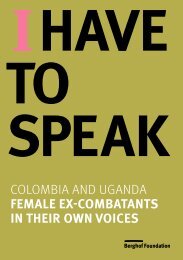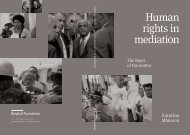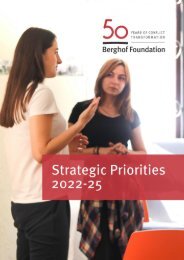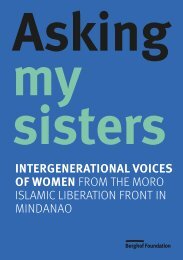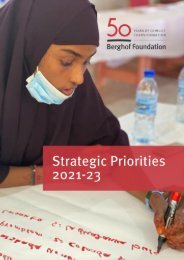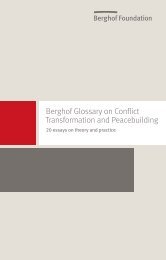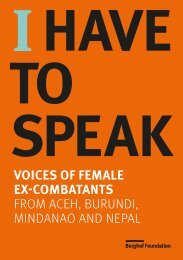Berghof Foundation: 50 years of conflict transformation
This book provides an overview of the Berghof Foundation’s work and impact over the past 50 years and sheds light on the challenges ahead of peacebuilding.
This book provides an overview of the Berghof Foundation’s work and impact over the past 50 years and sheds light on the challenges ahead of peacebuilding.
You also want an ePaper? Increase the reach of your titles
YUMPU automatically turns print PDFs into web optimized ePapers that Google loves.
Interview<br />
Experiences<br />
<strong>of</strong> a facilitator<br />
Dr Nadia<br />
al-Kwkabani<br />
Programme<br />
Manager at<br />
the Political<br />
Development<br />
Forum<br />
You’re an architect by training and are now doing<br />
peacebuilding work. How did that come about?<br />
I teach at Sanaa University. When the<br />
demonstrations began outside the University in<br />
Change Square in 2011, I was one <strong>of</strong> the academics<br />
who supported the protests and held teach-ins on<br />
the revolution at the Square. Later, I was invited to<br />
become part <strong>of</strong> the National Dialogue Conference<br />
that was initiated as a result <strong>of</strong> the protests. That’s<br />
how I became involved in peacebuilding: out <strong>of</strong> the<br />
conviction that Yemen needed the efforts <strong>of</strong> all<br />
Yemenis, especially women, to work on dialogue, on<br />
finding solutions and creating a political process.<br />
What was your exact role in the Yemeni<br />
National Dialogue?<br />
After the end <strong>of</strong> the National Dialogue, I<br />
became part <strong>of</strong> a consultation group convened by<br />
the Political Development Forum and the <strong>Bergh<strong>of</strong></strong><br />
<strong>Foundation</strong>. The group was designed to advise on<br />
the implementation <strong>of</strong> the outcomes <strong>of</strong> the National<br />
Dialogue. After the war broke out, the group kept<br />
meeting to try to find a political solution to the<br />
<strong>conflict</strong> and I became the facilitator <strong>of</strong> our meetings.<br />
I facilitated different meetings between <strong>conflict</strong><br />
parties, discussing power-sharing, maps and<br />
federations, as well as process-related issues.<br />
We shared the results with the United Nations<br />
Envoy’s <strong>of</strong>fice. In 2018, I became Programme<br />
Manager at the Political Development Forum and<br />
oversaw all the joint projects with <strong>Bergh<strong>of</strong></strong>.<br />
Working as a facilitator for political meetings<br />
and dialogues is not easy. It was hard, especially at<br />
first, when the war started and everything became<br />
polarised. It was a risk for the different sides <strong>of</strong> the<br />
<strong>conflict</strong> to sit together and to talk — there was a lot<br />
<strong>of</strong> nervousness and harsh criticism and personal<br />
attacks. I always tried to find common ground to<br />
bridge arguments and <strong>conflict</strong>s. I learned to use<br />
breaks strategically to defuse <strong>conflict</strong>s or encourage<br />
participants to talk and reconnect on a personal level.<br />
I have learned two important lessons from this work.<br />
Preparation is key: the facilitator needs to know about<br />
people’s background, what is important to them, and<br />
how they are interacting. And the facilitator has to<br />
have an understanding <strong>of</strong> the agenda points and key<br />
issues. Always prepare very well!<br />
What were your favourite and your most difficult<br />
moments in your peacebuilding work over the past<br />
ten <strong>years</strong>?<br />
I am proud <strong>of</strong> my role in the Yemeni National<br />
Dialogue, where I defended the rights <strong>of</strong> women<br />
and where we, the independent women’s group<br />
in the Dialogue, managed to secure a 30 per cent<br />
quota for women in Parliament and other decisionmaking<br />
bodies. This was one <strong>of</strong> the main outcomes<br />
<strong>of</strong> the dialogue, which then was unfortunately not<br />
implemented due to the war. I am also proud <strong>of</strong> what<br />
we are doing now: working to build peace in the midst<br />
<strong>of</strong> war.<br />
The war in Yemen — and everything that<br />
comes with that — has <strong>of</strong> course been tremendously<br />
challenging. For me personally, it was hard to<br />
continue working in these situations, to travel 10 or<br />
12 hours to different cities to have meetings, or travel<br />
abroad. Having to go through checkpoints, dealing<br />
with insecurity has been challenging; it’s not easy to<br />
move between different areas in the country. But I<br />
believe in what I am doing and this keeps me going.<br />
What challenges do you see ahead, and what makes<br />
you hopeful?<br />
I see many challenges. Continuing to work<br />
and to believe that the war will end is challenging,<br />
and it is already clear that what comes after — the<br />
transition — will not be easy. But this war will come<br />
to an end sooner or later, and we will cross these<br />
bridges when we come to them.<br />
What makes me hopeful is that Yemenis are<br />
sick <strong>of</strong> war and ready for peace. Also the flexibility<br />
I saw in the meetings I facilitated makes me more<br />
optimistic. Some people are willing to compromise.<br />
That’s actually one <strong>of</strong> the main secrets <strong>of</strong> success in<br />
this field: being optimistic.<br />
74<br />
75




